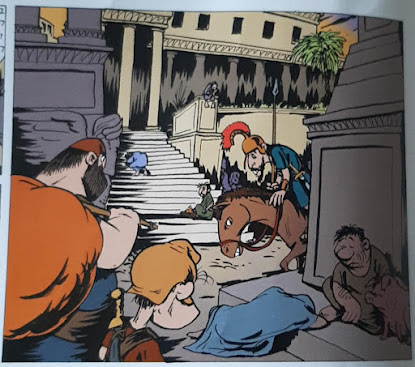Conspiracy theory: The modern Samaritans have preserved ancient Assyrian customs
Long time no see guys. In-between balancing school and homework, ideas for posts have been little to practically non-existent. But earlier this week I finally thought up of something that is blog-worthy, in my humble opinion (and since I run this blog, that humble opinion is what goes around here... ;))
The first word in the post's title was not really my choice: Last night I told over my new idea to a friend from university and he said: "Hmm. Interesting conspiracy theory..." Personally, I would have gone just with "theory", and I told him that. He proceeded to explain why he thought it was a conspiracy theory, but let's not get into that (he also believes it's wrong to term "Biblical archeology" with any word that has anything to do with the Tanach, AKA the Bible...we won't get into that either today).
About a month ago, the archeology department had a field trip to Mt. Gerizzim, and after that we went to meet some of the leaders of the Samaritan community of Shechem. They told us some of their customs and laws. One of the things they spoke about was how they keep Yom Kippur. One key aspect of Yom Kippur, according to them, is the Fast of the Children, i.e., all children that have finished nursing must also fast. Yeah, you read correctly - sometimes even year-olds or two-year-olds must fast for 24 hours! According to the Samaritans, seeing the suffering of their children is part of the atonement process of the adult.
For some reason I found myself thinking about this odd (and, frankly, at least a little abusive) custom earlier this week, and then it hit me: Something similar can be seen by the atonement of the people of Nineveh described in the Book of Yonah (3:5-8):
"The people of Nineveh believed God. They proclaimed a fast, and great and small alike put on sackcloth. When the news reached the king of Nineveh, he rose from his throne, took off his robe, put on sackcloth, and sat in ashes. And he had the word cried through Nineveh: “By decree of the king and his nobles: No man or beast—of flock or herd—shall taste anything! They shall not graze, and they shall not drink water! They shall be covered with sackcloth—man and beast—and shall cry mightily to God. Let everyone turn back from his evil ways and from the injustice of which he is guilty."
We find here that everyone in Nineveh fasted - grownups and children and even animals. And in the Talmud it is written on this fast (Taanit 16a):
"The verse states: “But let them be covered with sackcloth, both man and beast” (Jonah 3:8). What did they do? They confined the female animals alone, and their young alone, in a different place. They then said before God: Master of the Universe, if You do not have mercy on us, we will not have mercy on these animals. Even if we are not worthy of Your mercy, these animals have not sinned."
We therefore find a forbearer of the strange, extremist atonement process of the Samaritans by the Assyrians in Nineveh. Is there a connection?
Yeah, there might be. According to Tanach, the Assyrians exiled to Samaria groups from a few different locations (Melachim 2:17:24):
"The king of Assyria brought [people] from Babylon, Cuthah, Avva, Hamath, and Sepharvaim, and he settled them in the towns of Samaria in place of the Israelites; they took possession of Samaria and dwelt in its towns."
These people are thought to be the ancestors of the Samarians, hence they were known in Talmudic times as "Cuthites" or "Kutim", because it seems that the main group were the people from Kuta. Kuta, according to the Talmud (Bava Batra 91a), was Ur Kasdim, which is in Babylon, so the chances of Assyrian customs becoming so ingrained isn't as high. However, there were other places in the list. One is S'farvaim. S'farvaim, according to Eusebius in his Onomestikon (a book in which he lists all of the place-names in the Christian Bible and those that he knew where they were located in his day, he identifies), S'farvaim was in Assyria.
*Lightbulb lighting up*
Yep, the people of S'farvaim were from Assyria. Why were they exiled to Samaria? Not wholly clear. But it's possible that they brought some Assyrian customs with them, and echoes of these customs are preserved to this day by the Samaritans.
Would be interesting to study this more deeply, to see if this idea has any real substance. Maybe one day.

Comments
Post a Comment